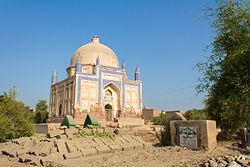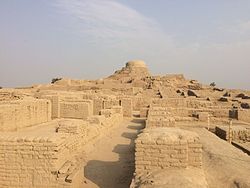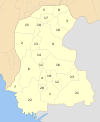Larkana District
Larkana
لاڙڪاڻو ضلعو ضلع لاڑکانہ | |
|---|---|
 | |
| Coordinates: 27°33′36″N 68°13′35″E / 27.56000°N 68.22639°E | |
| Country | |
| Province | |
| Division | Larkana |
| Established | 1 August 1901 |
| Founded by | British Government |
| Headquarters | Larkana |
| Government | |
| • Type | District Administration |
| • Deputy Commissioner | Tariq Manzor chandio since 2019 |
| • District Police Officer | SSP Muhammad Nawaz shaikh |
| • District Health Officer | N/A |
| Area | |
| 1,948 km2 (752 sq mi) | |
| Population | |
| 1,784,453 | |
| • Density | 920/km2 (2,400/sq mi) |
| • Urban | 798,151 (44.73%) |
| • Rural | 986,302 |
| Time zone | UTC+5 (PKT) |
| Languages | Sindhi |
| Number of Tehsils | 04 |
| Website | www |
Larkana District (Sindhi: لاڙڪاڻو ضلعو; Urdu: ضلع لاڑکانہ) is a district of the Sindh province of Pakistan. Its largest city is Larkana, which sits on the banks of the Indus River. It is the home district of the influential Bhutto family.
Other towns in the district include Ratodero, Dokri, Bakrani, and Naodero. In 2005, the Government of Pakistan under Pervez Musharraf bifurcated the district, forming a new district called Qamber and Shahdadkot, with the two towns of Qambar Khan and Shahdadkot.
History
[edit]The District came into existence on 1 August 1901, when it was formed out of the Karachi and the Shikarpur districts. The Sehwan, Johi, and Dadu talukas were taken from the Karachi district, and the Mehar, Kakar, Warah, Larkana, Labdarya, Kambar and Ratodero talukas were taken from the Shikarpur District, which since has been known as the Sukkur District. Three divisions were formed, the Sehwan division comprising the Sehwan, Johi and Dadh talukas, the Mehar division comprising the Mehar Tehsil, Kakar and Warah talukas, and the Larkana division comprising Larkana, Labdarya, Kambar, and Ratodero talukas.
By 1911, it had been recognized that the Larkana Division was too heavy a charge for one officer, even with the assistance of an attached Deputy Collector, and a new division known as the Ratodero Division was created out of it. Twenty-two dehs from Ratodero, four from Larkana, and forty-four from Kambar were combined to form a new taluka in the northwestern extremity of the District, with headquarters at the village of Miro Khan. The limits of the new taluka were similar to those of the old Sujawal taluka of the Shikarpur District which was abolished around 1883. This new taluka and the reduced Ratodero taluka were combined to form the new division. A minor feature of the change was the transfer of the ten western dehs of Larkana Tehsil to Kambar. Ratodero Tehsil has since been absorbed into Larkana and Mehar subdivisions. Each of the four divisions is in charge of an Assistant Collector or Deputy Collector.[citation needed]
In 1931, Larkana District was split, and the new Dadu District was created.[citation needed]
Administration
[edit]The district of Larkana is administratively subdivided into the following tehsil:[2]
- Dokri Tehsil (Labdarya Tehsil)
- Bakrani Tehsil
- Larkana Tehsil
- Ratodero Tehsil
- Naudero Tehsil
Economy
[edit]Around 10 km away from Larkana City, sugarcane is cultivated and processed at the Larkana Sugar Mills (Pvt) Ltd. plant, which was inaugurated by former Prime Minister Zulfikar Ali Bhutto on 30 January 1974.[3]
Larkana's guava and berries are famous both nationally and internationally, with the annual output of the district standing at thousands of tons. All the villages of Larkana District on the right bank of the Indus River have vast guava orchids spread over thousands of acres, located in Dodai, Mahotta, Naudero, Chooharpur, Agani, Metla, Izzat Ji Wandh, Phulpota and other villages.[4][5]
Education
[edit]The Government Pilot School was built in 1926, being the oldest education institution in the district. Cadet College Larkana was inaugurated by the former Prime Minister of Pakistan Benazir Bhutto in 1994, first planned by her late father Prime Minister Zulfikar Ali Bhutto in 1975. The College is located 24 kilometres (15 mi) away from Larkana, and some 3 kilometres from Mohenjo-daro.[6]
Colleges and universities in Larkana District:[citation needed]
- Govt. Pilot School Larkana
- Govt. Degree College Larkana
- Shaheed Zufiqar Ali Bhutto Institute of Science and Technology Larkana
- Govt. College of Technology Larkana
- Sindh Science College Larkana
- Global Science College Larkana
- Govt. Chandka Medical College Larkana
- Benazir College of Nursing
- QUEST Larkana
- Allama Open University Larkana
Transport
[edit]Moenjo Daro Airport is located near Mohenjo-daro, 28 km away to the south of the city of Larkana, and about 5 kilometres away from Dokri. The main airline which serves the airport is Pakistan International Airlines, the country's national flag carrier. The outdated infrastructure of the airport prevents the use of large, advanced aircraft, with Pakistan International Airlines largely using Fokker aeroplanes for flights.[citation needed]
Demographics
[edit]According to 2023 Pakistani census population of Larkana district is 1,784,453 consists of males 932,604 males and 851,732 females. 798,151 living in urban areas while 986,302 in rural areas.
There were 1,765,521 Sindhi, 10,199 Brahui, 3,201 Balochi, 2,198 Mewati, 1,376 Pashto, 847 Urdu, 375 Saraiki, 274 Punjabi, 258 Hindko, 55 Kashmiri, 3 Shina, 1 Balti, 1 Kohistani and 144 others.
| Year | Pop. | ±% p.a. |
|---|---|---|
| 1998 | 1,001,608 | — |
| 2017 | 1,521,786 | +2.23% |
| 2023 | 1,784,453 | +2.69% |
| Sources:[8] | ||
| Religion | Population (1941)[9]: 52–53 | Percentage (1941) | Population (2017)[10] | Percentage (2017) | Population (2023)[11] | Percentage (2023) |
|---|---|---|---|---|---|---|
| Islam |
191,621 | 76.34% | 1,498,148 | 98.45% | 1,754,523 | 98.32% |
| Hinduism |
58,052 | 23.13% | 22,116 | 1.45% | 25,794 | 1.45% |
| Sikhism |
1,283 | 0.51% | — | — | 38 | 0% |
| Others [b] | 61 | 0.02% | 1,522 | 0.10% | 4,098 | 0.23% |
| Total Population | 251,017 | 100% | 1,521,786 | 100% | 1,784,453 | 100% |
At the time of the 2017 census, Larkana had a sex ratio of 961 females per 1000 males and a literacy rate of 53.80%: 65.33% for males and 41.89% for females. 698,898 (45.93%) lived in urban areas. 466,715 (30.67%) were under 10 years of age.[10] In 2023, the district had 321,837 households and a population of 1,784,453.[1]
At the time of the 2023 census, 98.94% of the population spoke Sindhi as their first language.[12]
Sport
[edit]The Larkana Bulls cricket team was established in 2013.[citation needed]
Larkana Cricket Stadium, alternatively called the Shaheed Mohtarama Benazir Bhutto International Cricket Stadium, was built by the Pakistan Cricket Board in Garhi Khuda Bakhsh near the tomb of Benazir Bhutto.[13][14]
Notable people
[edit]- Bhutto family:
- Zulfikar Ali Bhutto - 9th Prime Minister of Pakistan
- Benazir Bhutto - 11th and 13th Prime Minister of Pakistan
- Mumtaz Ali Bhutto - 13th Chief Minister of Sindh
- Abida Parveen - Sufi singer
- Sohai Ali Abro - Actress, dancer and model
See also
[edit]References
[edit]- ^ a b "TABLE 1 : HOUSEHOLDS, POPULATION, HOUSEHOLD SIZE AND ANNUAL GROWTH RATE" (PDF). www.pbscensus.gov.pk. Pakistan Bureau of Statistics. 2023.
- ^ "District Larkana Online! [ApnaLarkana.com] - First Official & Commercial website on District Larkana... Complete guide to Larkana, Sindh, Pakistan. Larkana, Chandka, Moen jo daro, benazir Bhutto, Zulfiqar Bhutto, garhi khuda baksh, murtaza bhutto, bhutto". apnalarkana.com. Retrieved 23 March 2016.
- ^ "LARKANA SUGAR MILLS (PVT) LTD". enic.pk. Retrieved 23 March 2016.
- ^ the Newspaper (14 March 2013). "Berries and guava of Larkana". dawn.com. Retrieved 23 March 2016.
- ^ Web Desk (15 January 2015). "Chilly weather badly affects guava orchid crop". Pakistan Times. Archived from the original on 8 October 2015. Retrieved 23 March 2016.
- ^ Official, CCL. "Cadet College Larkana". Archived from the original on 28 March 2016. Retrieved 23 March 2016.
- ^ a b "District Wise Results / Tables (Census - 2023)" (PDF). www.pbscensus.gov.pk. Pakistan Bureau of Statistics. Cite error: The named reference "2023 census" was defined multiple times with different content (see the help page).
- ^ "Population by administrative units 1951-1998" (PDF). Pakistan Bureau of Statistics.
- ^ "CENSUS OF INDIA, 1941 VOLUME XII SINDH PROVINCE" (PDF).
- ^ a b "District Wise Results / Tables (Census - 2017)". www.pbscensus.gov.pk. Pakistan Bureau of Statistics.
- ^ "Pakistan Census 2023" (PDF).
- ^ "Pakistan Census 2023" (PDF).
- ^ Larkana. "Larkana Stadium". Dawn. Retrieved 22 March 2016.
- ^ "Shaheed Mohtarama Benazir Bhutto International Cricket Stadium - Pakistan - Cricket Grounds - ESPN Cricinfo". Cricinfo. Retrieved 23 March 2016.
Notes
[edit]- ^ 1941: Larkana, Labdarya and Ratodero talukas of Larkana district. District and taluk borders have changed since 1961.
- ^ Including Jainism, Christianity, Buddhism, Zoroastrianism, Judaism, Ad-Dharmis, or not stated



